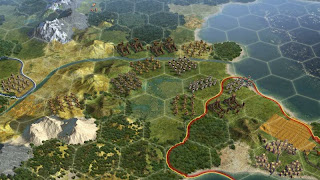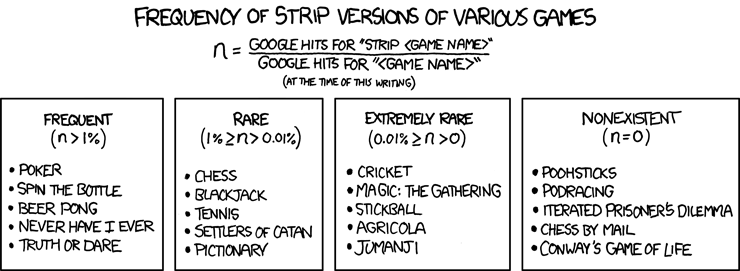
Anne, Chris, Fred, Scott and I started up
Here I Stand at around 10am. Rob, who was scheduled to play, had an emergency plumbing event, and was late, so we had to switch roles around. As per the suggested rules, England and the Protestants joined forces (until such time as Rob could make it). So the players were:
- Ottomans -- Chris
- Hapsburgs -- Brian
- England -- Fred
- France -- Anne
- Papacy -- Scott
- Protestants -- Fred, then Rob, then Fred.
We were playing the 1532 scenario, which starts at Turn 4. Some of the events may have happened a turn earlier or later, but this covers the gist.
Turn 4 -- The Ottomans drove quickly on Vienna, but had a terrible time. The Knights of St. John harrased them, they had terrible weather, and bad luck. Poor infidels. The Holy Roman Empire, having already circumnavigated the globe, sent out another explorer to the new world, joined by both English and French explorers. The Pope granted Henry a divorce. (I'm not entirely sure what deals were made for that. I believe England gave away shiny baubles that had previously been rejected by the Manhattan Indians). Henry, disgusted with his new wife Anne Bolyen ("I shall never share here bed!") declared war on Scotland, which allied with French. Unbeknownst to the Scots, however, the French had been bought off, and they simply retreated out of Edinborough (the Scottish troops returning to Paris in the winter). The Protestants .... well, they tried, but the sweet smell of Popery made significant gains in Germany. About the only good thing the Protestants can say is that nobody was burned at the stake. Non-major powers fell like flies .... France took Milan (enslaving their artisans to help build Chateaus later on), the Hapsburgs took Metz and claimed the Electorate of Koln from the Protestants (while they were in the neighborhood). . I believe the Turks took Tunis, but that may have been turn 5. Eventually the explorers came back, with the de Gama discovering the Amazon, the French making a minor discovery (I think) and the English getting nothing. The Hapsburgs held the lead at 20 VP, with the Pope and Turks just behind, France in the mid-teens, and England and the Protestants in single digits.
Turn 5 -- By this point, the Protestants had fired their CEO and replaced Fred with Rob, who nailed an "Under new management" sign next to his Thesis. No major diplomacy happened ... apparently everyone was happy with their current war (or not). The Turks claimed Vienna, and started some Piracy in the Tyrrhenian against yours truly. I gave him a VP, to help encourage others to view the Turks as a threat. I built up my fleet completely, but was still outclassed by the Turks (I should have tried to get loaned navies ...). The Turks also put down an uprising in Egypt with brutal efficiency. Protestant Reformation II ("This time, it's biblical!") showed much more success than the first try. The French built a nice Chateau, sent more explorers to the new world, and also sabotaged the Holy Roman Emperor's ships. Jane Seymour gave birth to a healthy Edward the VIth, catapulting England into the pack. The Protestants held off all Papal barbecue attempts. The Ottoman push for Prague caused Charles to drop what he was doing in Europe and make a (slightly desperate) counter attack at Belgrade. Belgrade fell, Prague held out until the end of turn 6. At the end of the turn, England and France snapped up the last discoveries in the New World. At the end of this turn the pack was much tighter, spread from 20-15 points.
Turn 6 -- Charles made overtures to the Sultan to end the war o

n roughly even terms (returning Vienna for Belgrade). However, the Sultan felt that he couldn't make enough gains from Piracy and had no convenient target to declare war on. Charles didn't press the issue, a strategic blunder that was revealed when France declared war on the Hapsburgs (and Genoa, for good measure). The Pope (using the Genoese as an excuse) declared war on France. Still not yet alarmed, Charles sent some conquistadors to the new world. Henry, never one to turn down an opportunity, used his special ability to declare war in the middle of the round. So the Holy Roman Empire was at war with everyone but the Pope. This, as you can expect, does not lead to good long term prospects. I put up a valiant fight, including the "Should have been a storybook victory" Battle of Navarre, where a lone Spanish troop sallied forth against the French invaders ... and then mysterious reinforcements showed up (Landsknechts) and 1/3rd of the French army changed sides (Bribe Mercenaries). But then it was
siesta time, so the French still won. C'est la Guerre. I suffed the indignity of being besieged by three seperate powers, losing Prague, Antwerp, Metz and Navarre. Charles rushed back to Spain to lead the Armada against the infidel Turks (trying to capitalize on Barbossa's death and the splitting of the Turkish fleet) but was repulsed. The remainder of his fleet conveyed the Spanish army to Marseille, which quickly fell. Beaten down, Charles ordered the founding of a 3rd colony in the new world, having little hope in the old.
Meanwhile, the reformation started to stumble again, so the Protestants switched gears and started littering Germany with soldiers, out to spread the word. The Jesuits showed up and dropped a bunch of universities in Germany (no surprise) and the still-totally Catholic London and Bristol (big surprise). France took Genoa. In the New World, the Spanish finally found someone they could defeat ... the Incas, which salvaged a few VP. The Turks ended the turn tied with England (I think), but without as many prospects, and the rest of the players a few points behind.
Turn 7 -- I finally saw some benefit from my (heretofore unproductive) colonies, but Raiders stole them my riches, so I had to content myself with what I looted from the Incans. Spain and France declared peace, and exchanged Marseille for Navarre. (We should have formed an Alliance, which would have let me spring deploy Charles into Brussels, threatening Antwerp and Metz from the get-go). I considered suing either England or the Turks for peace, but it would have given the Turks too many VPs (since they get a bonus for each war they win) and England could have just declared war on my again right away. Charles appeared in Brussels and quickly built up a new army. The Turks retook Belgrade, although they were slowed down when Ibrahim went back home to deal with a minor uprising. The Pilgramage of Grace put half of England into unrest, but Henry used the cover to proselytize against the Pope and placed troops in strategic locations (to get back the VPs caused by unrest). The protestants translated the new testament into French AND founded Calvin's institute, which doubled the number of heretics in Europe. Charles' attempt to take Metz ended in disaster when his mercenaries deserted. Antwerp, left without much of a garrison, rebelled ... and rebels had grabbed control of the artillery, so Spain retook the city. At this point, both the Turks and England were at 23 VP (and 25 ends the game). Suleiman landed in Italy to make an attempt at Naples, while Henry sent troops to Antwerp and Paris. In the end, though, Suleiman's gout was too much to bear, and his army loitered at Messina as both European cities fell to the Victorious English.
Overall, we spent about 8 hours playing the game (around 2 hours a turn), not counting setup, but we also had a lunch break and some plumbing delays. The first turn was closer to 3 hours (since those of us who had played before hadn't played recently) and there was quite a bit of rules lookup involved. I suspect next time we'll be able to shave 30 minutes a turn or so (I hope). We'll see.
Thanks to Anne again for hosting, as well as providing lunch.
Labels: Here I Stand, session report
.jpg) Well, its already March! Speaking of March, there should be a pile of games marching onto my doorstep this month, including the new Combat Commander Battlepack #3 and Washington's War, further evidence that all games worth reprinting eventually will be. The Washington's War Playbook, now on-line at GMT's website, provides an interesting commentary by the designer on the changes he made from the original We the People game.
Well, its already March! Speaking of March, there should be a pile of games marching onto my doorstep this month, including the new Combat Commander Battlepack #3 and Washington's War, further evidence that all games worth reprinting eventually will be. The Washington's War Playbook, now on-line at GMT's website, provides an interesting commentary by the designer on the changes he made from the original We the People game.









